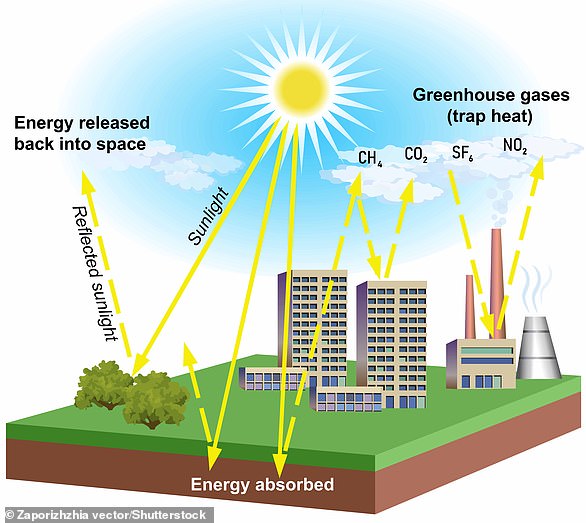Global carbon dioxide (CO2) emissions from burning fossil fuels are set to be the highest on record in 2025, a new report reveals.
Experts at Global Carbon Budget estimate a total of 38.1 billion tonnes of carbon dioxide (CO2) emissions by the end of the year – up 1.1 per cent from last year.
This new figure is based on preliminary data and computer modelling, but if it turns out to be accurate it would mark a record high.
This year, researchers report some positive evidence of efforts to combat the climate crisis; for example, the UK is one of 35 countries whose fossil CO2 emissions are declining while their economic output is growing.
However, overall global energy demand is still pushing many countries towards fossil fuel use at the expense of the planet.
Study author Glen Peters at the CICERO Center for International Climate Research in Oslo, Norway, said ‘fossil CO2 emissions continue their relentless rise’.
‘It is clear countries need to lift their game,’ he said.
‘We now have strong evidence that clean technologies help reduce emissions while being cost effective compared to fossil alternatives.’
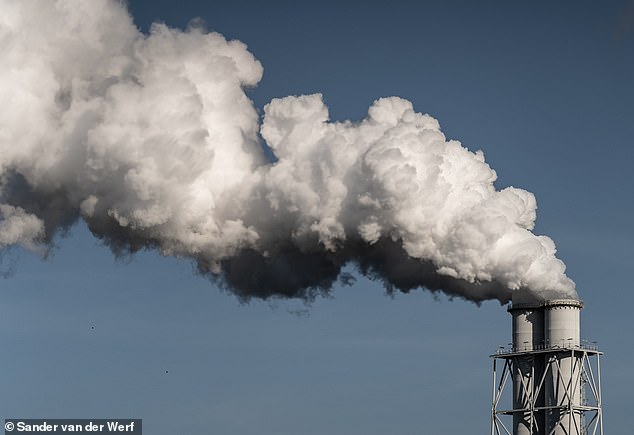
To meet the world’s vast energy demands, power plants across the world burn ‘dirty’ fossil fuels – namely coal, oil and gas
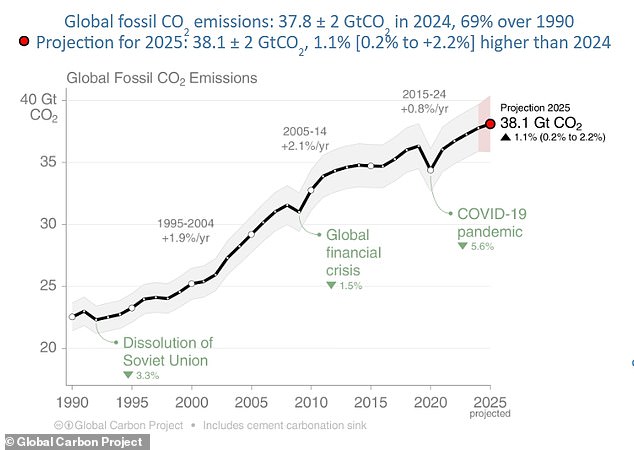
Global carbon emissions from fossil fuels are projected to rise by 1.1 per cent in 2025 – reaching a record high, according to new research by the Global Carbon Project
The new Global Carbon Budget report, published on Thursday morning, has been produced by an international team of more than 130 scientists.
Due to the record, lead author and climate scientist Pierre Friedlingstein thinks we will breach the the 1.5°C temperature threshold set by the Paris Agreement, the legally binding international treaty on climate change signed in April 2016.
The Paris Agreement aims to keep global temperature increases below 1.5°C compared with ‘pre-industrial’ levels – i.e., those before the Industrial Revolution when humans significantly triggered global warming with the burning of fossil fuels.
‘With CO2 emissions still increasing, keeping global warming below 1.5°C is no longer plausible,’ said Professor Friedlingstein at the University of Exeter’s Global Systems Institute.
‘[There’s] a clear signal from Planet Earth that we need to dramatically reduce emissions.’
To meet the world’s vast energy demands, power plants across the world burn ‘dirty’ fossil fuels – namely coal, oil and gas – to create heat, which is in turn used to generate steam to drive turbines which generate electricity.
When fossil fuels are burned, they release large amounts of CO2 (a greenhouse gas that traps heat) into the air, plus other toxic byproducts – which is why scientists call for countries to make the switch to ‘renewable’ energy sources like solar and wind.
According to the new report, total global CO2 emissions are projected to be slightly lower in 2025 than last year, but those specifically from fossil fuels will hit a record high (38.1 billion tonnes). This figure include emissions not just from power plants, but from planes and cars, because they use oil, a fossil fuel.
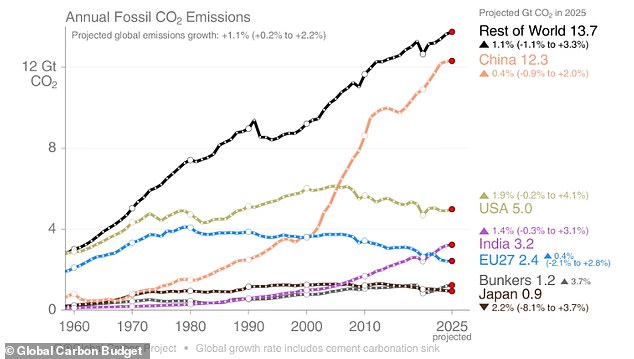
By far, China releases more CO2 from fossil fuels than any other country – around 12.3 billion tonnes – followed by the US, India and EU countries
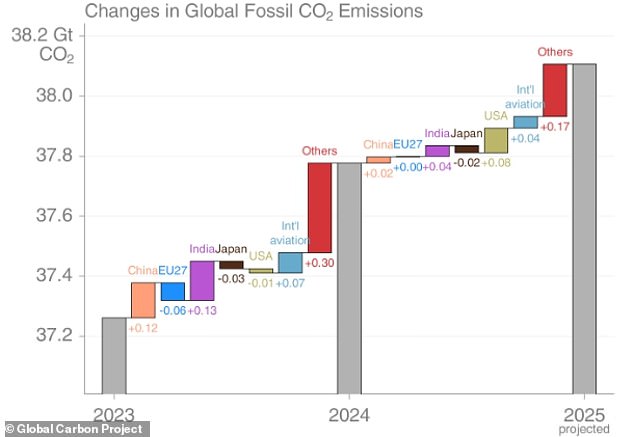
In 2025, fossil fuel emissions are projected to increase in the US and India, see a slight rise in China, be flat in the EU and decline in Japan
By far, China releases more CO2 from fossil fuels than any other single country (around 12.3 billion tonnes) followed by the US, India and EU countries, but all of these places are set to see an increase in emissions in 2025 compared with 2024.
China’s emissions in 2025 are projected to increase by 0.4 per cent, but growing more slowly than in recent years due to just a moderate growth in energy consumption and an ‘extraordinary’ growth in renewable energy.
India’s emissions increase by 1.4 per cent – also slower than recent trends, partly due to an early monsoon that reduced cooling requirements in the hottest months.
Emissions also grow in the US (1.9 per cent) and the EU (0.4 per cent), but are down in Japan by 2.2 per cent, while the UK’s emissions hover around 0.3 billion tonnes of CO2, about 0.8 per cent of world emissions.
However, CO2 emissions from burning fossil fuels is not the whole story; scientists say there’s been another 4.1 billion tonnes of CO2 emissions in 2025 from ‘land-use change’, slightly down from last year (4.2 billion)
Land-use change is defined as humans modifying the natural landscape, deforestation being one example as well as degradation.
Deforestation is the process of permanently removing trees, often to make way for planting crops and cattle grazing to accommodate the human demand for food. When deforestation occurs, much of the carbon naturally stored by trees is released back into the atmosphere as CO2.
In summary, global CO2 emissions from fossil fuels in 2025 are projected to be 38.1 billion tonnes while CO2 emissions from ‘land use change’ will be 4.1 billion tonnes – a combined total of 42.2 billion tonnes (which is down 0.1 billion tonnes from last year according to the team’s new revised methodology).
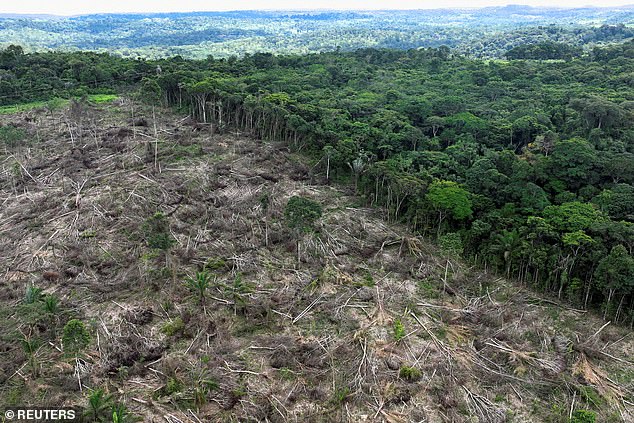
Deforestation is the process of permanently removing trees, often to make way for planting crops and cattle grazing to accommodate the human demand for food. Pictured, deforestation near Uruara, Para State, Brazil, January 21, 2023
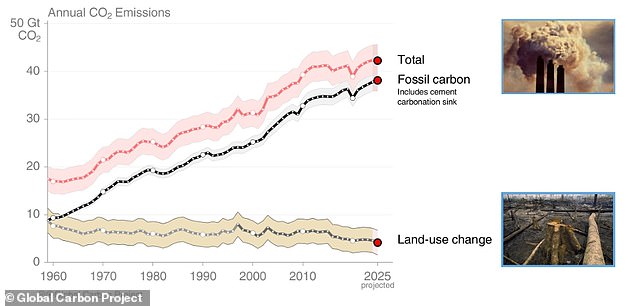
Globally, CO2 emissions from fossil fuels in 2025 are projected to be 38.1 billion tonnes, while CO2 emissions from ‘land use change’ will be 4.1 billion tonnes – a combined total of 42.2 billion tonnes
According to co-author Professor Corinne Le Quéré at the University of East Anglia, some efforts to tackle climate change are ‘visible’.
Decarbonisation of energy systems is progressing in many countries – but this is not enough to offset the growth in global energy demand.
‘Thirty-five countries succeeding in reducing their emissions while growing their economies, twice as much as a decade ago, and [there’s] important progress in reducing reliance on fossil fuels elsewhere,’ Professor Le Quéré said.
‘[But] progress is still much too fragile to translate into the sustained decreases in global emissions needed to tackle climate change.
‘The emerging impacts of climate change on the carbon sinks is worrying and stresses further the need for urgent action.’
The 2025 edition (the 20th annual report) of Global Carbon Budget is published in the journal Earth System Science Data as a pre-print, and will later be published as a peer-reviewed paper.
An accompanying Nature paper, entitled ‘Emerging climate impact on carbon sinks in a consolidated carbon budget’, is also published.

